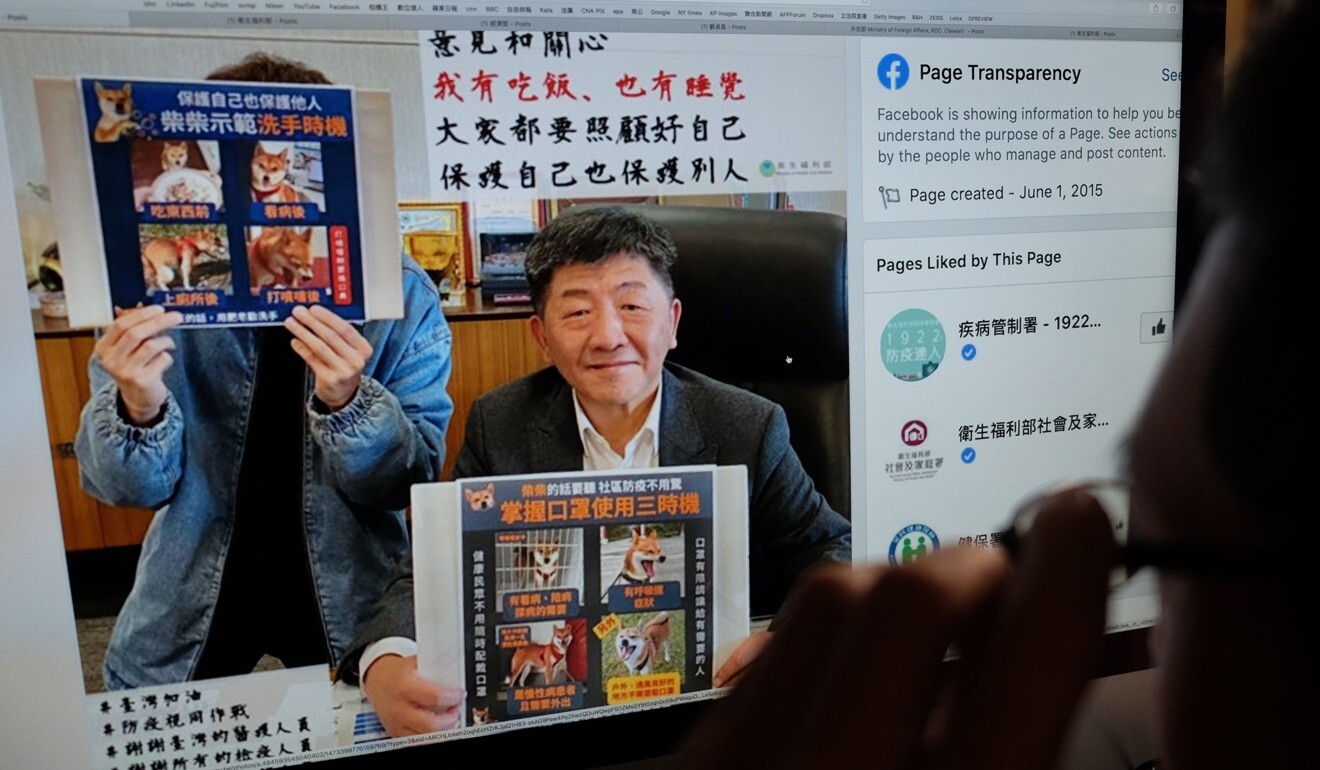
Taiwan rewards health minister Chen Shih-chung’s coronavirus success story
- The Taiwanese pandemic response has been one of the best in the world and the public is giving credit to one man
- Professionals and public praise calm, informative style and occasional displays of humour
“Shih-chung” is similar to the word for “clock” in Chinese, so the saying means, follow Chen’s instructions and survive, ignore them at your peril. Chen has been leading Taiwan’s response since his appointment to run the Central Epidemic Command Centre in January.
Most Taiwanese credit Chen’s swift response, timely orders and frank communications for sparing them the thousands of deaths they feared they might have suffered because of the island’s position just off the southeast coast of mainland China.

“In addition to watching his daily briefing at 2pm, I sometimes call up the health minister before I go to bed because I am so anxious to learn about the number of confirmed cases to be announced the next day,” Taiwan’s President Tsai Ing-wen told reporters on Wednesday.
“That way, I can sleep somewhat better,” she said, adding that when Chen reported to her there had been no new cases for the fourth day on Wednesday she celebrated by giving her two cats a midnight snack.
Chen has hosted his daily briefings, which also go online, since January 23. They provide the latest developments, including which relevant government agencies need to respond and how, and what steps the public should follow.
The hour-long briefings – which serve as a direct communication between the health authorities and the public – have frequently attracted audiences of more than 100,000 people.
“They are very useful, and I really appreciate that, especially when the minister honestly and candidly tells us what has happened and what we should do,” said Ho Wei-kuang, who owns a pub in Taipei.
A softly spoken former dentist, Chen has become known for his sincerity and ability to effectively communicate with the public, while at the same time displaying a trust-winning empathy, shown in his soothing response to a nationalistic outburst in February.
The pandemic was at its height in Wuhan and hundreds of thousands of Taiwan’s nationalistic online community heaped scorn on mainland-based Taiwanese businessmen, accusing them of bringing the disease to Taiwan and saying they should have stayed on the mainland.
Chen said: “No one wants to be sick, and everyone hopes to have the best treatment where they see fit.”
It was typical of the minister, who often tells reporters at the daily briefing: “Have a heart! We all should keep empathy in dealing with certain matters.”
He also issues regular reminders that “there shouldn’t be witch-hunting” and “those who get the infection from others are innocent because they don’t want to be infected”.
Words like these have softened the hearts of many Taiwanese who, haunted by the dangers of Covid-19, have seen patients as monsters or devils, according to psychologist Teng Hui-wen.
Taiwan’s coronavirus response wins rare praise from WHO
Doctor Chu Wei-min also praised Chen for being a good communicator with high emotional intelligence.
“When confronted by reporters, he is able to bring down the tension by patiently explaining the situation and not being offended,” Chu said, who also praised Chen’s habit of ending exchanges with a humorous or funny comment to calm the atmosphere.
In a news briefing on April 21, a reporter confronted Chen over an incident in which a number of sailors and cadets aboard a Taiwanese naval vessel were infected after returning from a friendship port call to Palau, one of the island’s 15 diplomatic allies.
The reporter asked what was the use of having the Central Epidemic Command Centre when the military apparently ignored its standard operating procedure.
“Well, it seems what you say is that you guys no longer want me to continue as the centre’s commander. I think I will get hurt a little bit hearing this,” Chen said, before going on to tell the reporter he was in close contact and communication with various government departments.
Since taking charge of the command centre on January 23, Chen – who has not taken a day off – has worked hard to keep Taiwan’s pandemic response in the hands of health professionals. He has often stressed that “political rhetoric would only spoil professionalism and confrontation serves only to split society”.
But, as health minister, the Taipei Medical University graduate must stay in line with government policy to promote the island’s health status in its argument that Taiwan should qualify to join the World Health Organisation and prevent any gaps in the global health arena.
Despite his hectic schedule – which includes time to write letters to the editors of a number of global news media – he recently spent 30 minutes promoting the island’s WHO cause in a telephone conference with his counterpart in the United States.
In a March 26 opinion poll by Taiwan’s cable news network TVBS, Chen – who has become the most searched person on Google in the past few months in Taiwan – was given an approval rating of 91 per cent, highest by far of all Taiwan’s politicians, including Tsai.
He was also supported by more than 50 per cent of respondents in another TVBS survey in April as best choice for mayor of Taipei in 2022. Chen later said he was not interested in the position.
Chen’s wife, Sun Wan-ling, said he was not suited to be a politician, as he cared too much about his medical work and the promotion of good health in Taiwan.
“He is a workaholic, often giving his time to work and meetings,” she said, adding that when she asked her four-year-old son what gifts should be given for his dad’s birthday, he said: “Work meetings.”

